Why You Should Raise a Guinea Fowl Flock on Your Homestead
Raising guinea fowl is a great way to start farming on a homestead. This article tells how and why you should raise a guinea fowl flock.
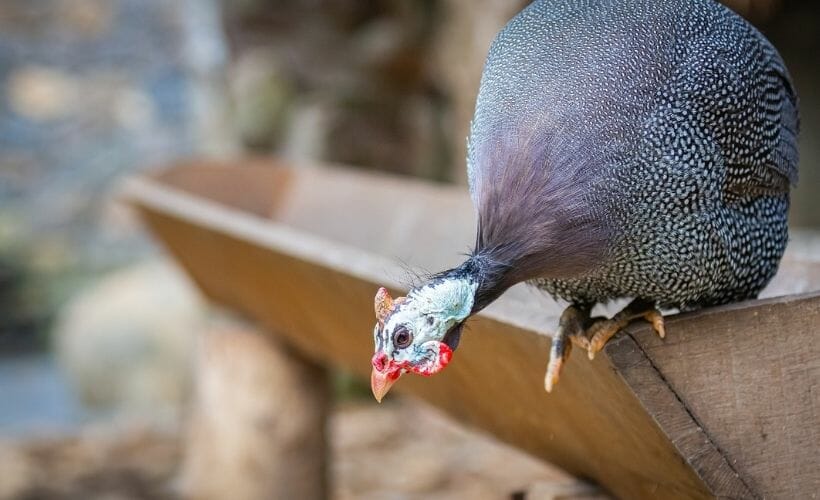
What Are Guinea Fowl
Guineas are a gamebird originally from Africa. They are strong, rugged, and generally disease-free birds. They look like mutant dinosaurs (in my personal opinion) and are a riot to watch.
The babies are called keets and are really cute, similar to a turkey poult in appearance. The males are called guinea cocks. The females are called guinea hens. Unlike chickens and ducks, guineas can’t be sexed by their adult feathers. Once they reach maturity, the male will be slightly larger with a larger, taller crest on top of his head. His wattles will be bigger and stick out farther than the females’. The female’s crest will be a bit smaller and angled back more, and her wattles will be smaller and not as deeply cupped. These are very subtle differences, though. Before (and after maturity) your biggest gender indicator is the sounds they make. Females make a two-syllable call that the males don’t make. It can sound like buck-wheat, come-back, or good-luck.
Why Raise Guinea Fowl
They are amazing watchdogs
Not only are guineas incredibly loud, so they tip off the other poultry on your homestead of potential danger, but they are also fearless. It is not unheard of for the flock to surround a fox and chase it off. This confidence seems to intimidate many prospective predators.
They eat ticks & snakes
Fun Fact: A single guinea fowl can eat up to 400 ticks in one day! We have three types of ticks around here and Lyme is a huge issue. Our farm dog got infected with Lyme last year and has had a couple of flareups since his initial infection. Anything we can do to cut down the tick population is worth it. The chickens and ducks try, but they are no match for the tick hunting skills of the guineas.
Guineas keep snakes in check as well as ticks. We don’t have venomous snakes in this area, but we have more garter snakes than any single property ever needs. Although generally docile, in large quantities garter snakes can get snippy with people and dogs. I don’t mind seeing the numbers dwindle. Guineas will take on aggressive and venomous snakes, even really large snakes. Their presence also keeps snakes at bay.
They control pests in the garden
Last year was a nightmare for my orchard. The deer showed up and tipped every single fruit tree. That stressed the trees out, releasing a hormone that attracted every june bug in the tri-state area and possibly even Canada. They survived, but it wasn’t pretty. Thankfully the guinea flock is on the mission now.
Like chickens, guineas are happy to eat the hornworms, slugs, grasshoppers, and caterpillars out of your garden. Unlike chickens, they don’t destroy the garden when they do it. I have a 5′ chainlink around my vegetable garden and that keeps the chickens out (they are fat and lazy), but the guineas fly right in and out as they please.
Guinea fowl will even scare off and chase the squirrels and other rodents that attempt to eat our corn!
They are nearly self-sufficient
For the most part, free-ranging guinea fowl will take care of themselves. They forage for the majority of their food, only eating commercial grain when nature isn’t providing enough for them. In our case, that’s winter.
Being hardy by nature, guineas almost never get sick. That’s not saying they can’t get sick, but it’s not nearly as common as illness in other forms of farm poultry, including chickens, ducks, and turkeys.
They also keep themselves relatively safe. They do well against predators when set up properly.
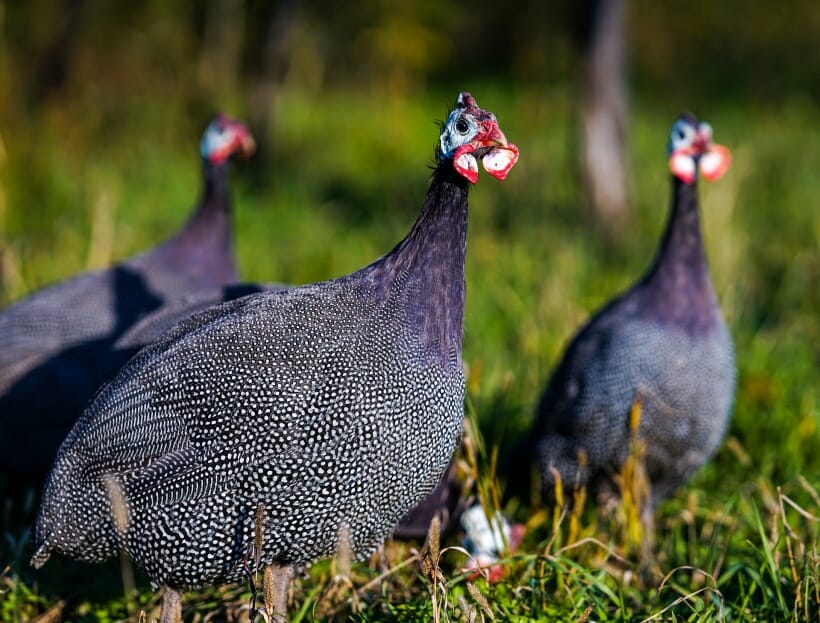
How To Keep Guineas Safe From Predators
Guineas are actually amazing predator control devices for the homestead. As mentioned above, they sound the alarm at every drop of a pin, warning the other birds on your property of potential danger. Having said that, they still need some protection themselves.
If you aren’t free-ranging your guineas, clip their wing (just one) and keep them in a fenced pen (like you would a chicken). If you are free-ranging, you can try to get them into a coop at night, but you’re better off accepting that they will be roosting in the trees. Clear any brush that may allow predators to sneak into the area. There is also strength in numbers, so plan to have 6 or more birds if you plan to free-range.
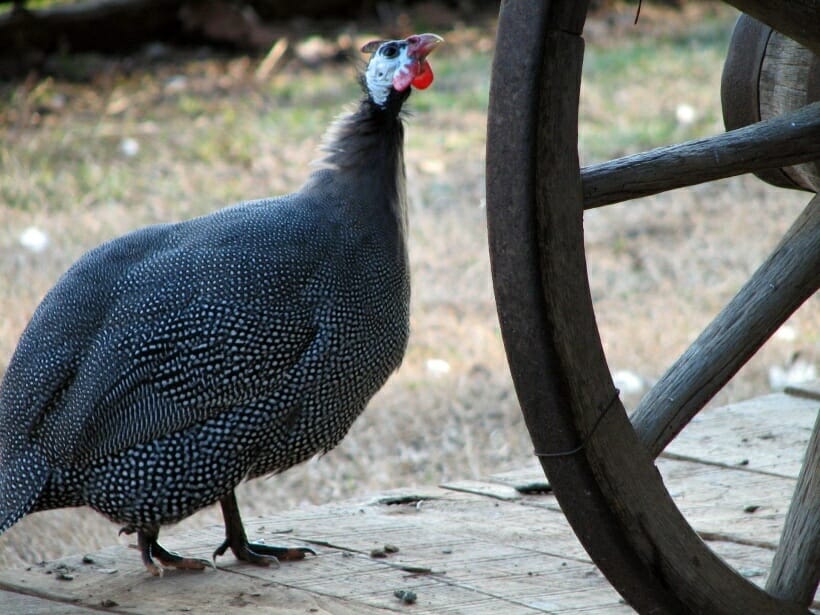
You’ll Like Guinea Fowl If…
… you have wide-open spaces.
Guineas need a minimum of 2 acres for any hope that they stay on your land, but even with 2 acres, they may venture further. They are free spirits and will appreciate having plenty of land to roam around on.
… you like poultry that takes care of itself.
You can easily rear the keets to adulthood and basically let them take care of themselves from that point on. Although the keets have a high mortality rate in the wild, guinea hens will happily raise their own and teach them how to survive. They’ll roost in trees at night and forage for their food (year-round if you live in an area that doesn’t snow).
… you appreciate the unique.
If you want a bird that leads guests to say “what the heck is that?!” guineas are for you! They are bizarre-looking and they behave strangely. They are quite the talking point. I personally find that endearing. Sort of a so-ugly-they’re-cute thing.
… you are into arts & crafts
Guinea feathers are so pretty! If you spend any time on Pinterest, you’ll find hundreds of things you can do with them. You can make jewelry, artwork, or fishing flys.
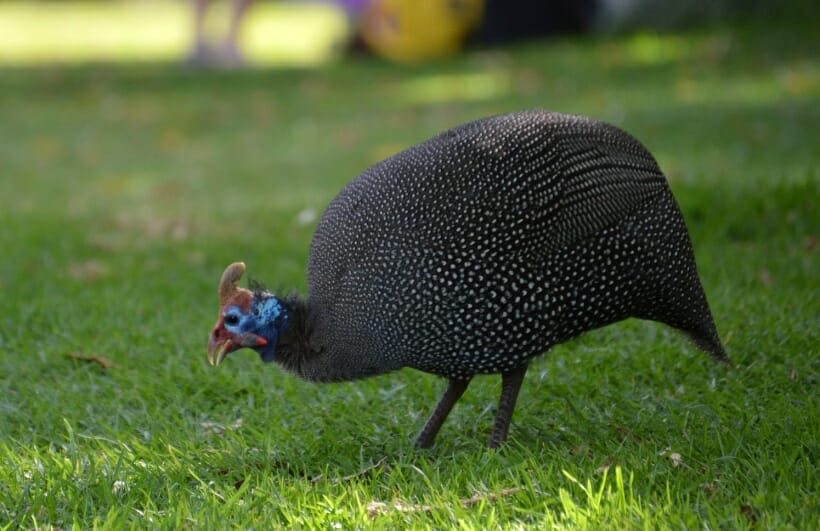
You May Not Like Guinea Fowl If…
… you have close neighbors that you like.
Guineas are incredibly loud. No, seriously. Imagine how loud you think this small bird could possibly be and then double it. My neighbor who lives over the river and through the woods knows when UPS shows up at my house.
… you like to be master of your domain.
Guineas are the cats of the poultry world. They don’t even pretend to take what you want into consideration. They do what they want when they want. You will never be in control and you need to accept that right from the get-go.
… you live near a paved road.
I can’t possibly imagine the reason for it (maybe it’s the heat), but guinea fowl are drawn to blacktop. They will go splay themselves out onto the road, oblivious to oncoming traffic. Some drivers will slow down and drive around them, but some drivers aren’t good people.
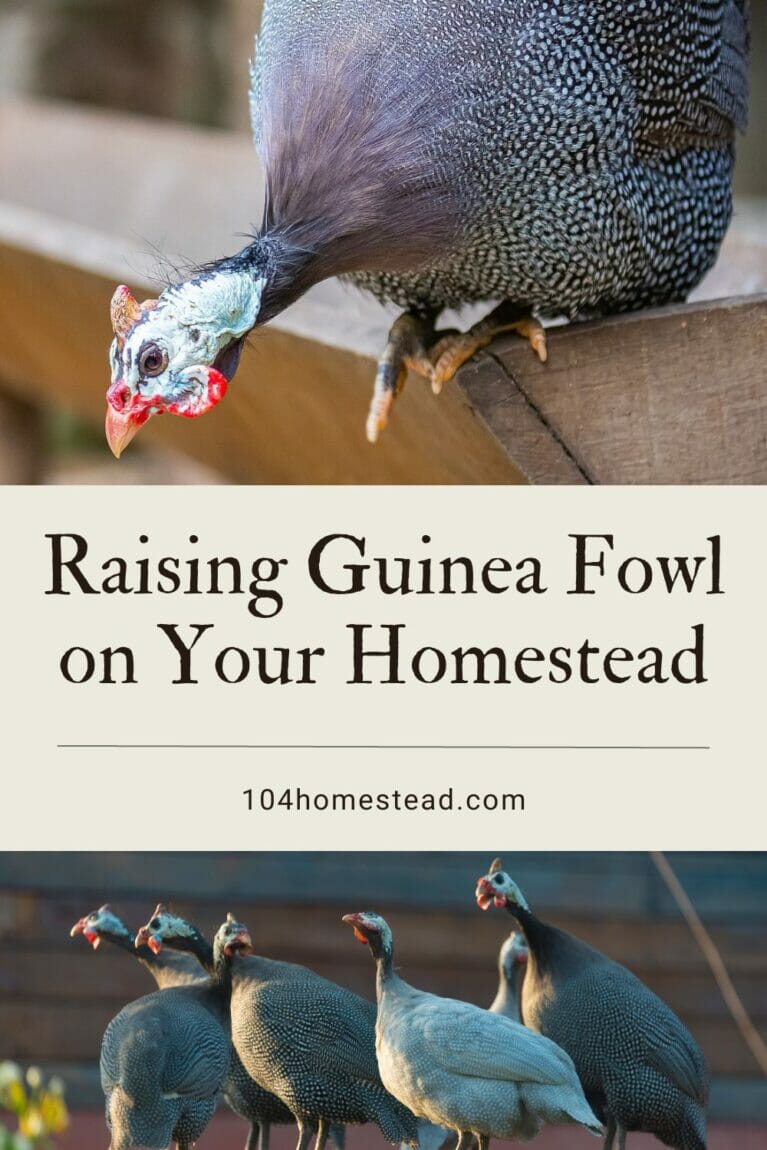
For more information about rearing guinea fowl, check out these books:
Gardening with Guineas: A Step-By-Step Guide to Raising Guinea Fowl on a Small Scale by Jeannette S. Ferguson
Guinea Fowl: The Complete Owners Guide by Adrian Marks
Guinea Fowl, Backyard Poultry: Keeping Guinea Fowl by June Rose
Chat with me!
Do you have guinea fowl? Do you think guineas are an asset to have on your homestead? How many do you think are a good number to have?
